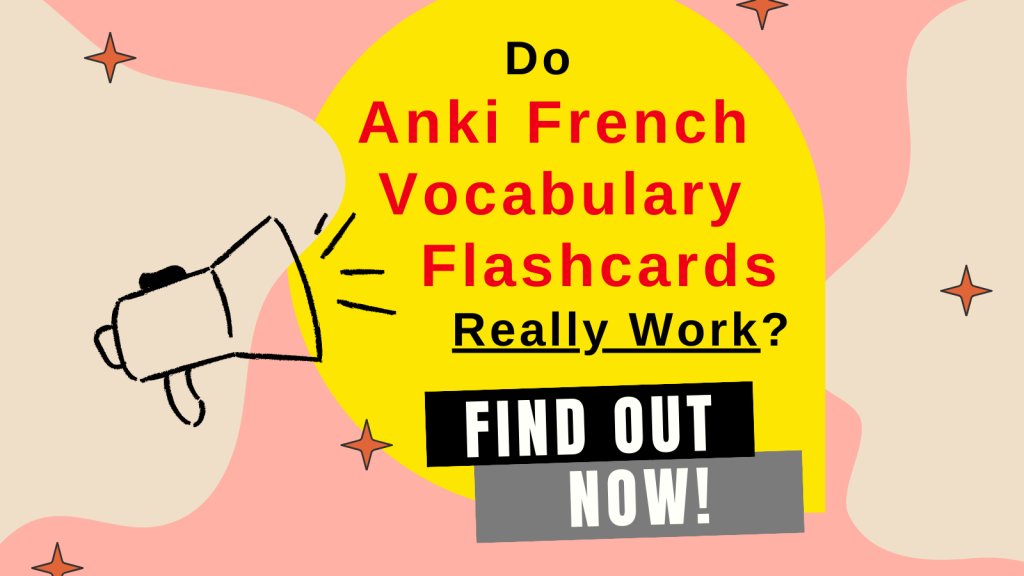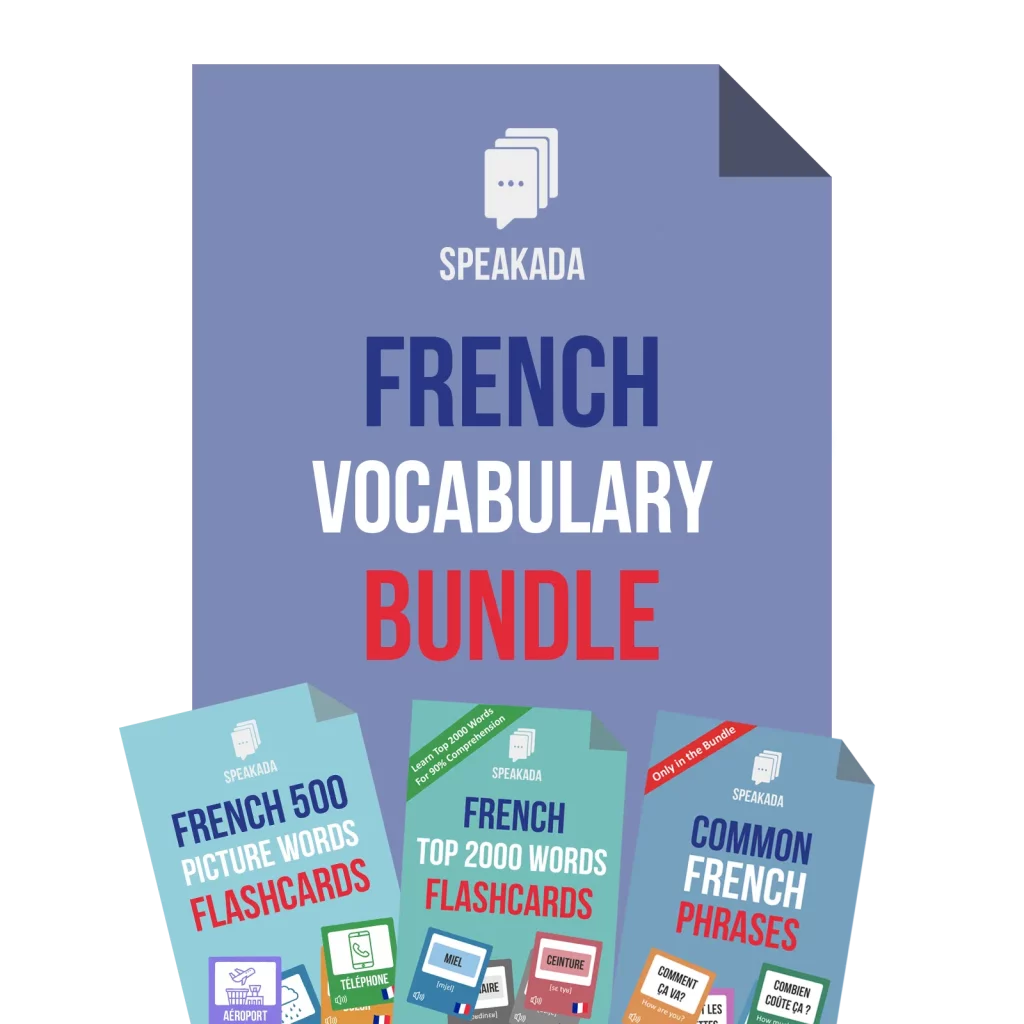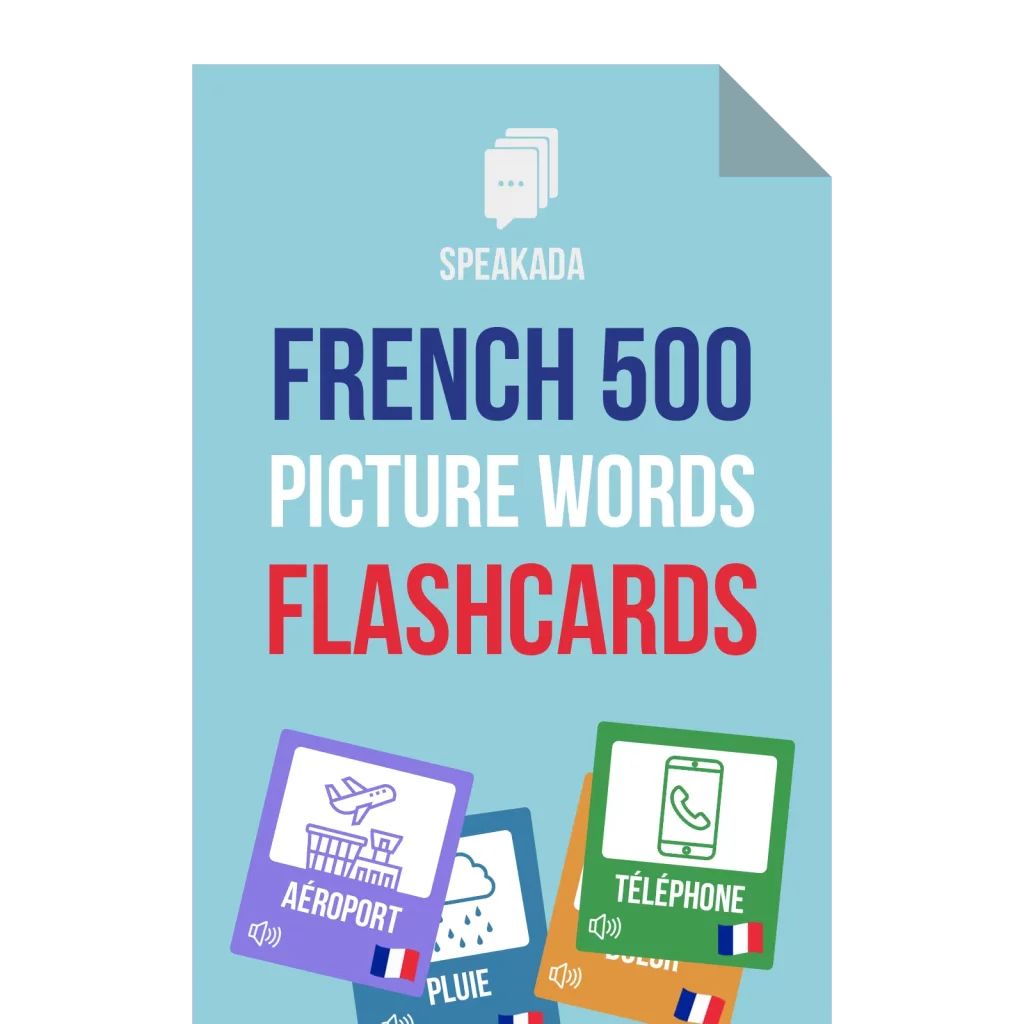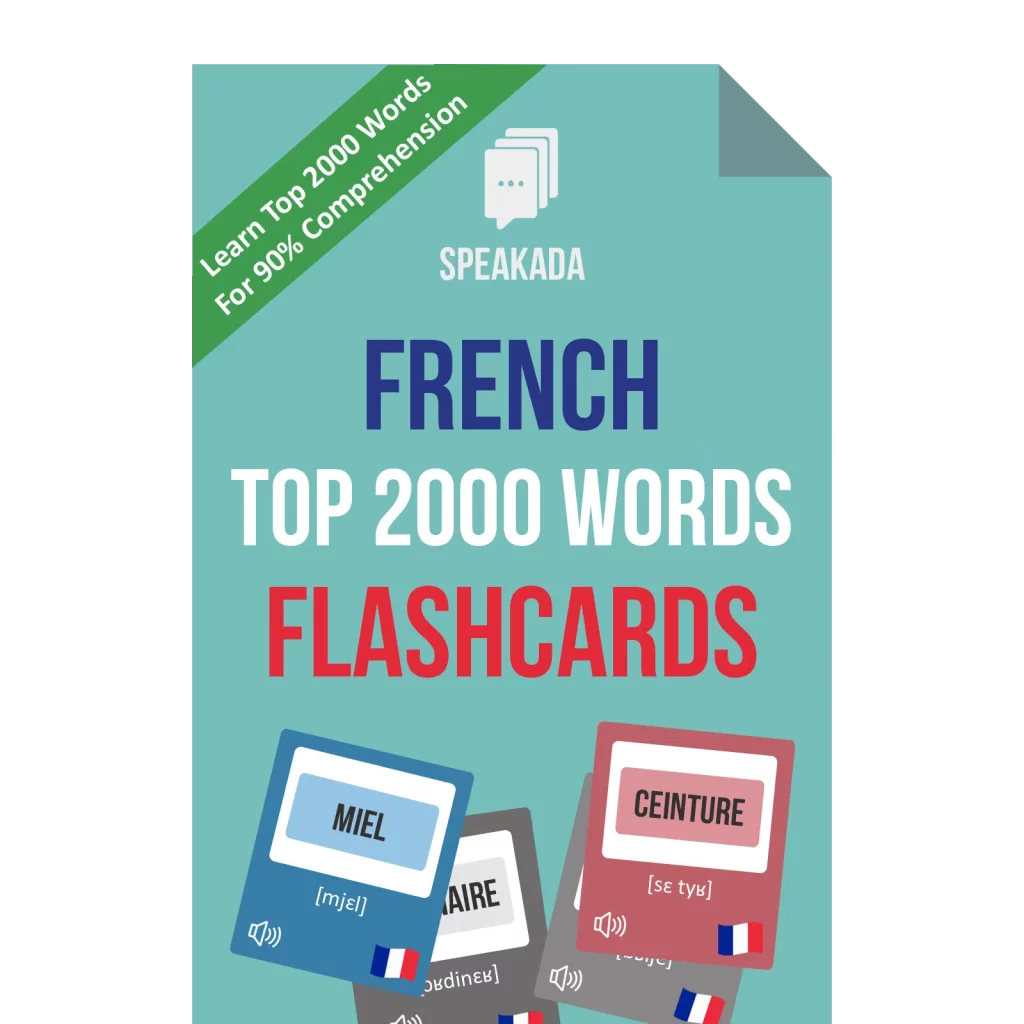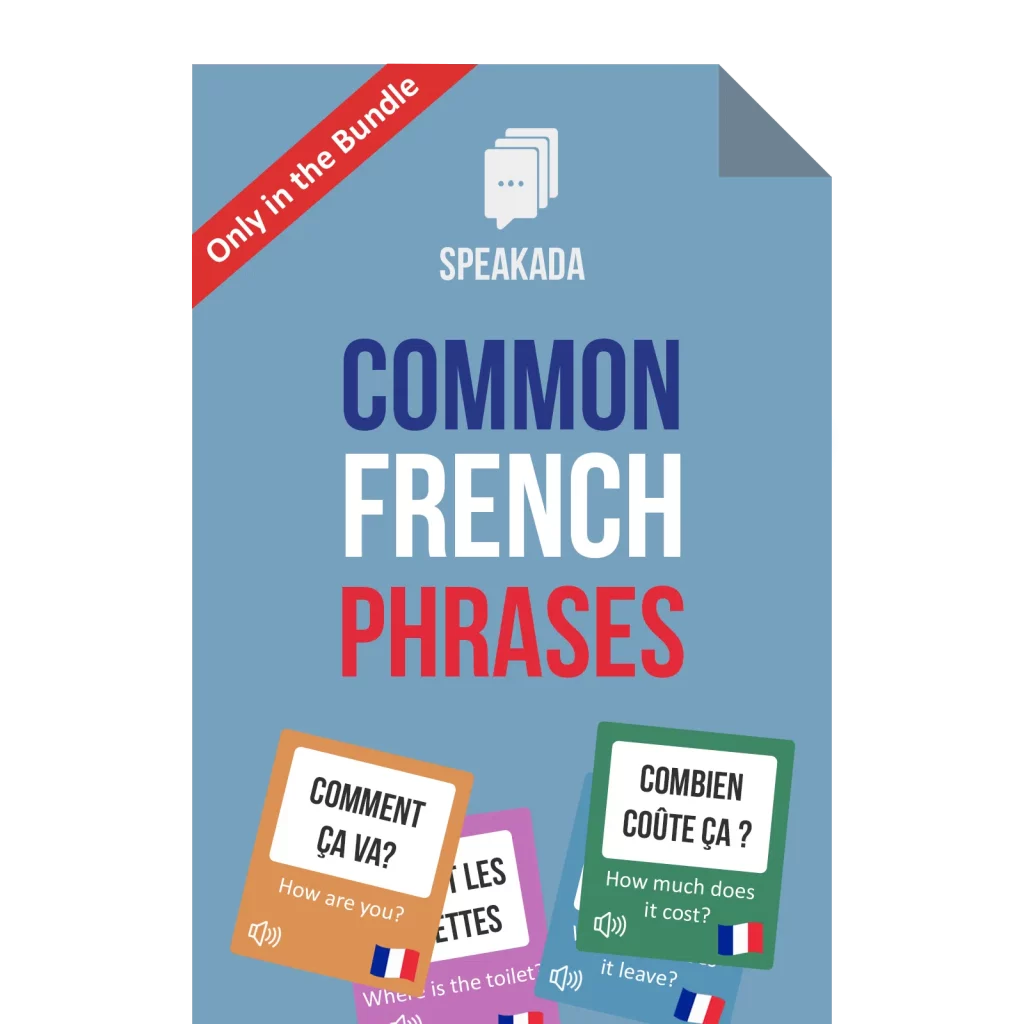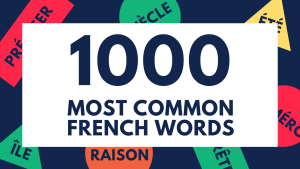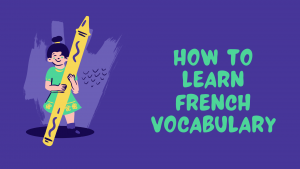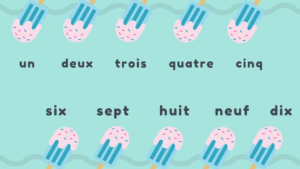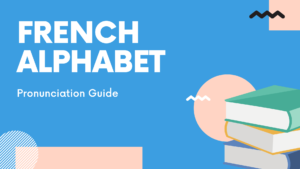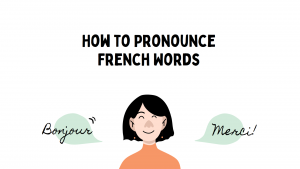Anki is a popular flashcard app and program that can be used to study a variety of subjects, including Anki French vocabulary.
But does it really work?
In this article, we’ll explore the research on the effectiveness of using Anki for vocabulary acquisition in French language learning.
How Does Anki Work to Learn Anki French Vocabulary?
Anki is a flashcard program that uses a spaced repetition algorithm to help users learn and retain information.
1) Creating Anki French Vocabulary Flashcards
When using Anki French vocabulary flashcards, the process involves creating cards that contain a French word or phrase on one side and useful information on the other side, such as the English translation, relevant image, audio, and more. The cards are then added to a deck and are presented to the user for review at increasing intervals of time, based on how well the user is able to remember the information.
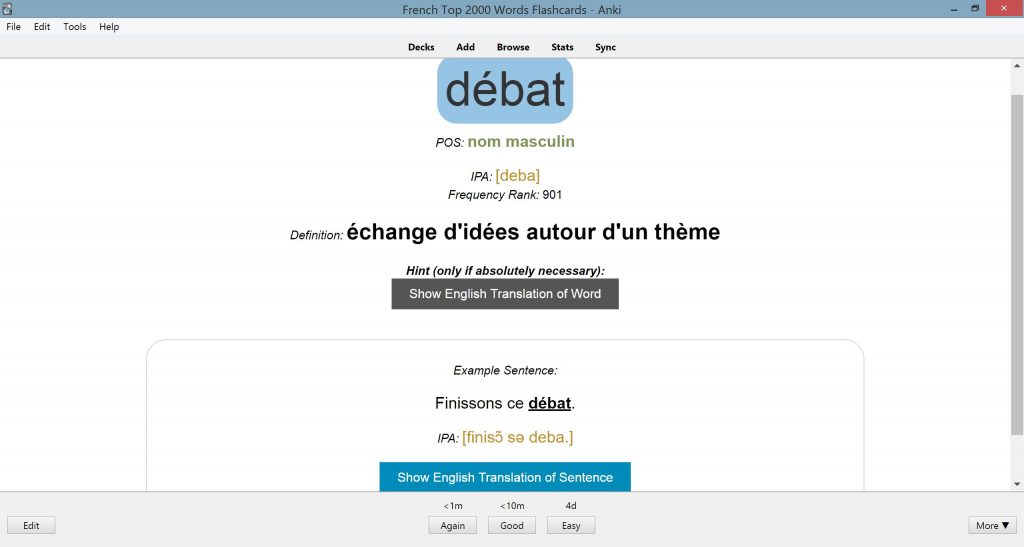
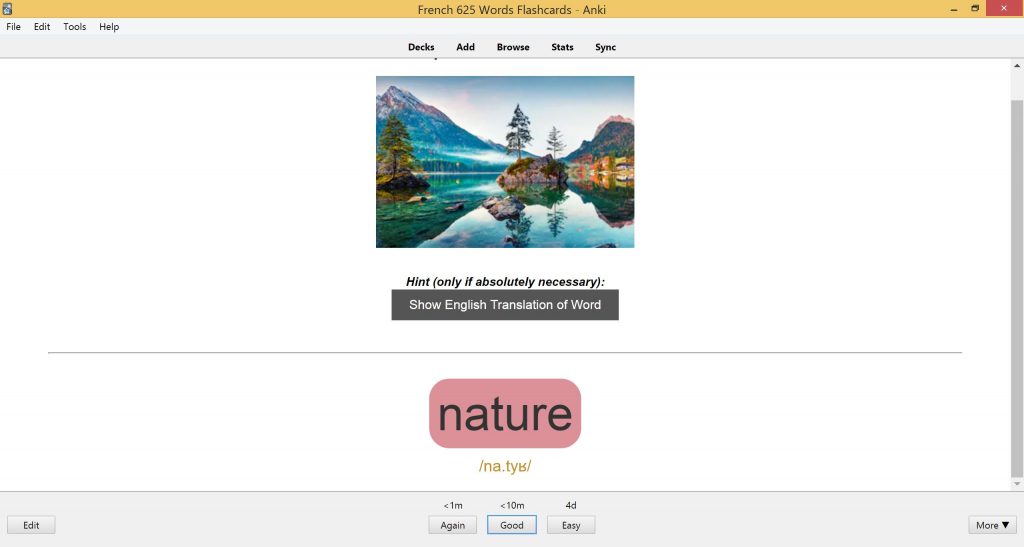
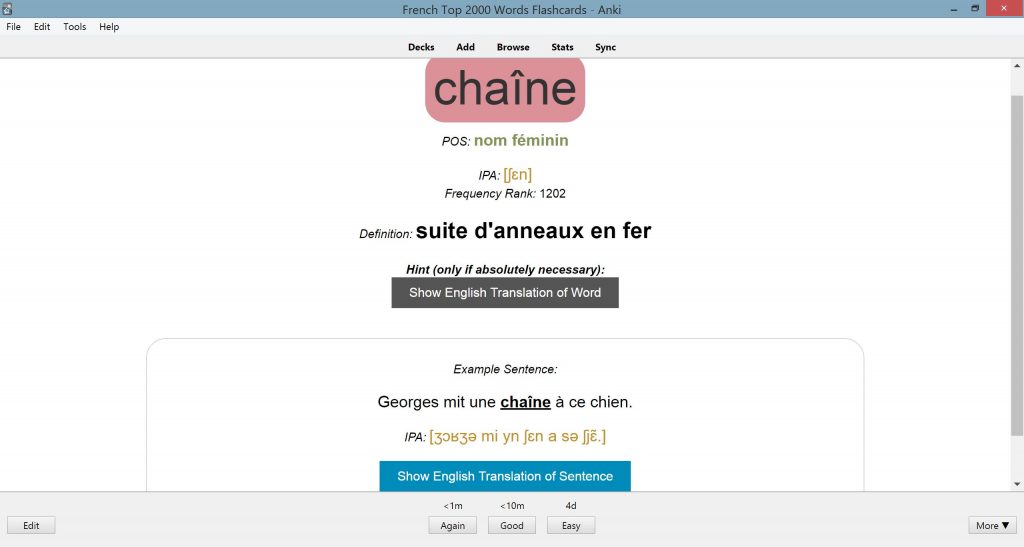
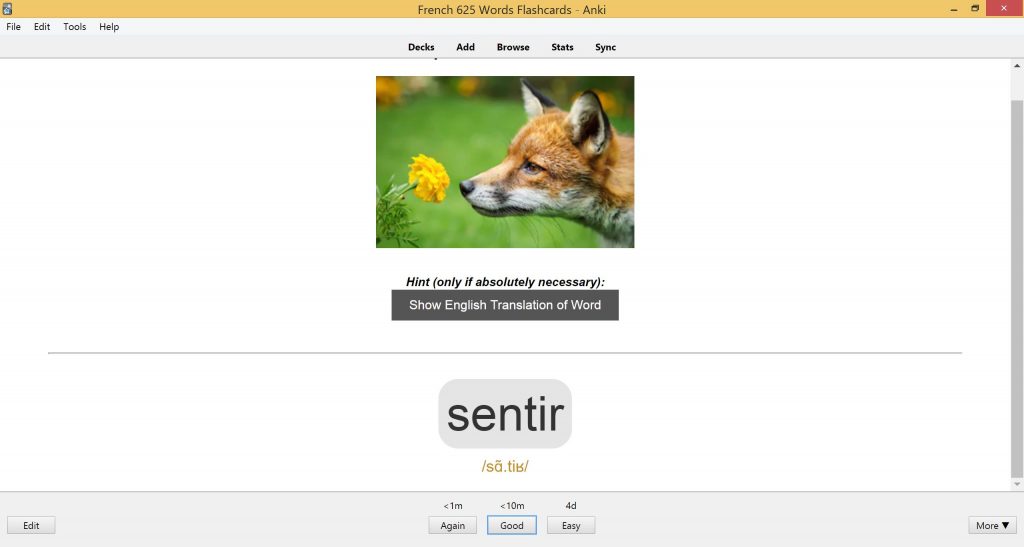
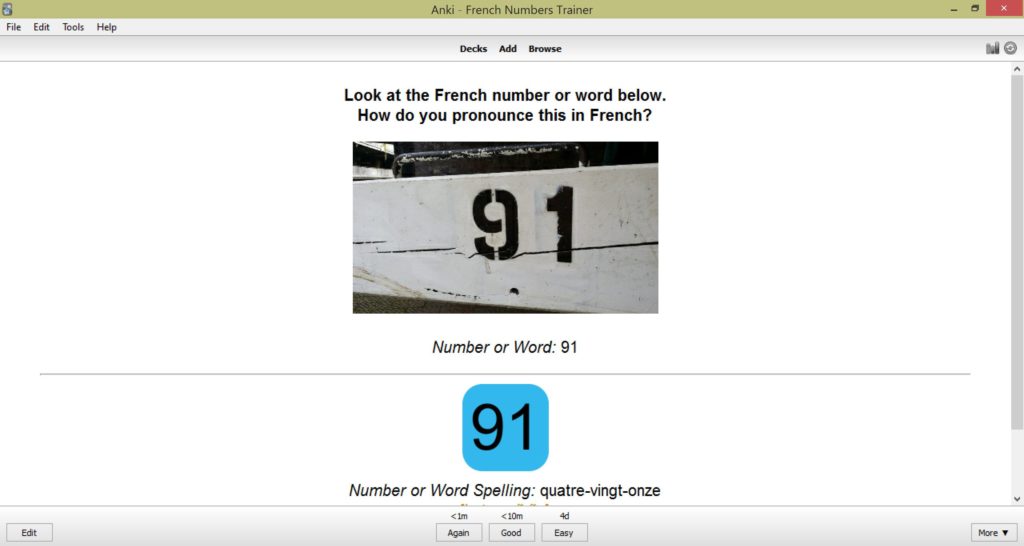
2) Reviewing Anki French Vocabulary Flashcards
The review process can involve the following steps:
- The learner is presented with a card containing a French word and asking them to recall the meaning of the French word.
- The learner then indicates whether they remembered the meaning correctly or not.
- If the learner remembers the meaning correctly, the card will be presented again at a later time.
- If the learner does not remember the meaning correctly, the card will be presented again in a shorter amount of time.
This process of reviewing Anki French vocabulary cards and adjusting the intervals between reviews is the key to Anki’s effectiveness.
What Makes Anki Effective for Vocabulary Acquisition?
Anki is so effective for vocabulary acquisition because the app is based on a number of principles in applied linguistics and cognitive science that are backed by extensive research.
Here are some core principles and relevant research that contribute to Anki’s effectiveness:
1) Spaced Repetition Algorithm
Anki’s spaced repetition algorithm is one of the key factors that make it effective for vocabulary acquisition. This algorithm is based on the principle of space repetition, where information is presented at increasingly longer intervals until it is learned and retained.
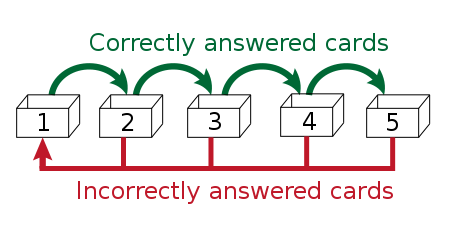
Several research studies have investigated the effectiveness of spaced repetition for vocabulary acquisition. Here are some noteworthy findings:
- A study conducted at the University of California, Los Angeles, highlighted that a study schedule that spaces study sessions on a particular topic can yield both good exam performance and long-term retention (Bjork & Bjork, 2011).
- Another study conducted at Macquarie University in Sydney, Australia, examined the relationship between the use of spaced repetition software with a TOEIC word list and TOEIC score gains. The Test of English for International Communication (TOEIC) is an international standardized test of English language proficiency for non-native speakers. The findings suggested a statistically significant relationship between total spaced repetition software repetitions and TOEIC listening and overall score gains. (Bower & Rutson-Griffiths, 2016).
However, despite the effectiveness of spaced repetition, many students struggle with spacing their study sessions on their own. A study found that students often fail to space their study sessions and instead tend to study a single chapter straight through, without revisiting earlier material. Additionally, a significant portion of students reported studying only the night before an exam, indicating a lack of consistent study habits (Delaney, Verkoeijen, & Spirgel, 2010).
These insights underscore the importance of leveraging spaced repetition algorithms, such as the one employed by Anki, to optimize Anki French vocabulary learning and retention.
2) Active Recall
Anki’s active recall feature is another reason why it is effective for vocabulary acquisition. Active recall, also known as retrieval practice, refers to the process of actively trying to retrieve information from memory, rather than passively reading or viewing it.
This is important because the act of actively recalling information, such as through Anki flashcards, helps to consolidate the information in the long-term memory, making it more accessible and easier to recall in the future.
Research studies have consistently supported the effectiveness of active recall for language learning:
- Studies, such as those by Barcroft (2007, 2013), Folse (2006), and Karpicke & Roediger (2008), have demonstrated that retrieval practice significantly enhances second language (L2) vocabulary learning. For example, Barcroft (2007) found that presenting L2 word forms after their meanings, allowing learners to retrieve the information, led to greater learning compared to simultaneous presentation. Similarly, Royer (1973) discovered that studying L1 and L2 word pairs printed on different sides of cards promoted better learning than when printed on the same side, emphasizing the role of retrieval practice.
- A survey conducted by Pan et al. (2022) revealed that college students commonly use digital flashcards for retrieval practice, aligning with recommendations from researchers and instructors. The popularity of retrieval practice as a learning strategy remains evident.
Despite the clear importance of active recall, Carpenter et al. (2022) highlighted learners’ misconceptions about effective learning strategies, noting that many students still choose less effective strategies like massing and restudying over spacing and retrieval practice. Despite the demonstrated effectiveness of spacing and retrieval practice across various learning materials, learners often prioritize ease over efficacy when selecting study methods.
These findings underscore the importance of incorporating active recall in a more systematic way, such as through Anki’s flashcards. When learners use the built-in active recall features of Anki flashcards for French study, they can optimize vocabulary acquisition and retention.
3) Multimedia Capabilities
Anki’s effectiveness in vocabulary acquisition is further amplified by its multimedia capabilities, enabling users to enrich their flashcards with audio, images, and other multimedia elements.
Research consistently supports the idea that integrating multimedia into vocabulary flashcards can significantly benefit language learners, providing them with a more dynamic and immersive learning experience.
- Enhanced Presentation: Nakata (2011) emphasizes the advantages of multimedia support in flashcards, highlighting its role in enhancing the presentation of materials.
By incorporating audio and visual elements, Anki helps learners interact with vocabulary in various formats, catering to diverse learning preferences and styles.
- Dual Coding Theory: Grounded in the Dual Coding Theory (DCT) proposed by Paivio (1979), the use of multimedia in word cards can optimize memorization by combining visual and verbal information (Lavoie, 2016). According to the DCT, cognition occurs through two distinct codes: a verbal code for language and a non-verbal code for mental imagery.
When learners process information through both channels simultaneously, they benefit from additional support that enhances L2 vocabulary learning. Previous studies, like Lavoie’s (2016), have demonstrated the additive effects of verbal and non-verbal input on vocabulary learning by comparing experimental groups that used word cards with visual aids to control groups.
- Recent Studies: Research by Li and Tong (2019) on embedding visual and audio elements in flashcards for Chinese language learners further underscores the advantages of multimedia integration.
By leveraging visual and auditory cues, learners can reinforce their understanding and retention of vocabulary more effectively.
These findings highlight the importance of Anki’s multimedia capabilities in helping you learn French vocabulary more effectively.
How Does Anki Compare to Other Language Learning Methods?
There have been several research studies that have compared the effectiveness of digital flashcards, including Anki French vocabulary flashcards, with other vocabulary learning methods.
Here’s a breakdown of some key comparisons:
1) Anki Digital Flashcards vs. Paper Flashcards:
Numerous studies have explored the advantages of digital flashcards over traditional paper-based methods for learning new words. Digital flashcards offer several benefits that paper flashcards just don’t have.
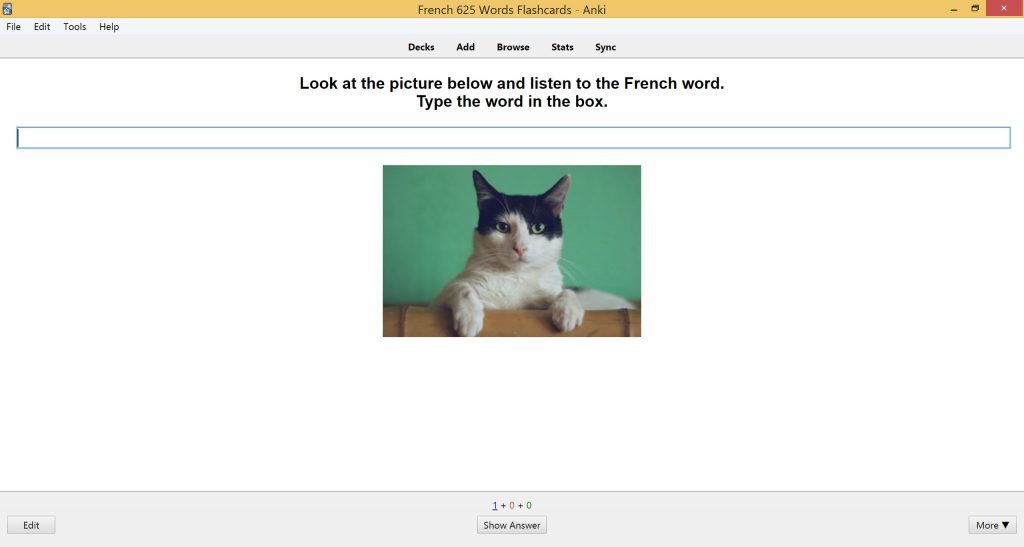
Digital flashcards, like the Anki app, provide advantages such as accessibility, customization options, and multimedia integration, which enhance engagement and retention (Lei & Reynolds, 2022).
2) Anki French Flashcards vs. Writing or Word Lists:
When pitted against writing or word lists, digital flashcards emerge as a more efficient and effective method for French vocabulary acquisition.
Research suggests that digital flashcards allow learners to focus more attention on unknown words, learn a larger number of words in a shorter period, and engage in both receptive and productive learning (Webb et al., 2020).
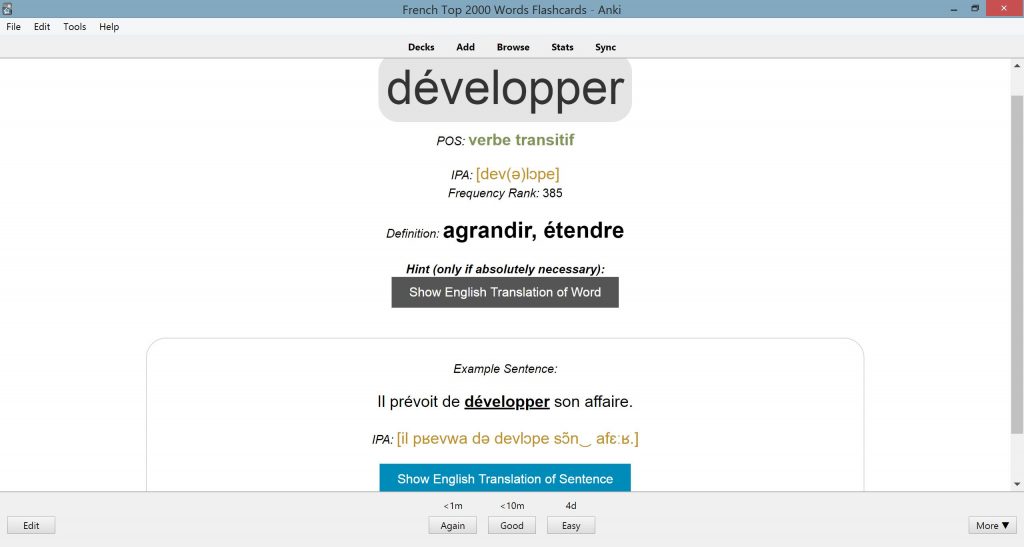
3) Digital Flashcards vs. Input Only:
Compared to language-focused learning methods that solely rely on native language input, Anki digital flashcards offer a more structured and targeted approach to vocabulary acquisition. The focused, efficient, and effective nature of flashcard learning enables learners to make significant gains in vocabulary knowledge (Nation, 2013a).
There is research suggesting that studying vocabulary using flashcards can help you learn words in two important ways: implicitly and explicitly (Elgort, 2011). This means that the vocabulary knowledge you gain from flashcards is the kind you need to use language naturally in everyday situations.
We agree that getting input from native-language materials is highly important. However, there are some difficulties with just learning from input alone. For example, it can be very frustrating and demotivating watching a French-language film and not understanding anything that the characters say.
In summary, research supports the superiority of Anki digital flashcards over traditional methods and input-only approaches for French vocabulary learning. Their focused, efficient, and effective nature, combined with multimedia capabilities, makes them a valuable tool in the language learning toolkit.
What does Research say about the Use of Anki French Vocabulary Acquisition?
Research studies have provided compelling evidence that Anki flashcards are highly effective for improving French vocabulary acquisition.
Here’s a breakdown of the findings:
Research on the Effectiveness of Anki for French Language Learning
Scientific research conducted at Arcadia University (Pennsylvania, USA) with students enrolled in a beginning Spanish course revealed a positive correlation between the use of Anki and Spanish language performance, even after controlling for baseline abilities and other factors.
“Participants were students enrolled in a beginning Spanish course who were assigned to study with Anki as a class requirement. The results showed a positive relationship between days studying with Anki and Spanish performance at the end of the semester even while controlling for baseline abilities and for motivation, self-efficacy, and beliefs.” (Hanson & Brown, 2019)
More Research on the Effectiveness of Anki for Learning Foreign Language Vocabulary
Studies focusing on vocabulary learning in other foreign languages, such as English, have shown promising results with Anki.
1) One study by researchers at Iowa State University and Usak University showed that integrating Anki into academic vocabulary learning significantly improved students’ vocabulary levels and retention rates.
“The vocabulary levels test results showed that the process of learning academic vocabulary with Anki helped college-level ESL students to improve their academic vocabulary… Explicit vocabulary learning helps learners to gain greater amount of vocabulary in a short period of time in addition to a better chance of retention. Learners practiced about two hundred academic words in three weeks and their scores increased significantly.” (Altiner, 2011)
2) Another study by scientists at the University of Ostrava, Czechia, involving the use of Anki in English language teaching demonstrated a positive relationship between the number of studied cards and overall language test scores.
“Research was carried out in the form of a pedagogical experiment in which the experimental group used the Anki mobile application…It found that there is a positive relationship between the number of achieved points and the number of studied cards. The results show that pupils who study a greater number of Anki cards will achieve a higher overall score in language tests.” (Javorčík, 2021)
3) A 2017 research paper in the “Technics Technologies Education Management” journal found that vocabulary learners who used Anki showed significant improvement in post-test scores compared to pre-test scores, highlighting the benefits of incorporating Anki into language classrooms.
“Students used the Anki application to study 20 new words every day during the three week intervention process….. The results of the paired samples t-test and effect size revealed that learners outperformed in their post-test as compared with their pre-test. Learners were able to do the entire study skill activity at their own pace and time using their own learning styles and strategies and receive immediate feedback on their learning.” (Zare & Barjasteh, 2017)
Multiple studies by researchers around the world have investigated the effectiveness of Anki for vocabulary acquisition in language learning, and the results are overwhelmingly positive. Overall, it is clear from the research that Anki can be an effective tool for learning and memorizing French words.
Final Thoughts: Evidence Shows that Anki French Vocabulary Flashcards Really Work
In conclusion, the wealth of research evidence demonstrates that Anki French Vocabulary Flashcards are indeed effective tools for language learners. From scientific studies conducted at various institutions worldwide to real-world classroom experiments, the findings consistently highlight the positive impact of Anki on French vocabulary acquisition.
Here’s a quick recap of the key takeaways:
- 1. Anki’s Spaced Repetition Algorithm: Backed by research, Anki’s spaced repetition algorithm optimizes learning by presenting flashcards at intervals that promote long-term retention. Studies have shown that spaced study sessions lead to improved exam performance and lasting knowledge retention.
- 2. Active Recall: Anki’s active recall feature encourages learners to actively retrieve information from memory, enhancing vocabulary acquisition and long-term retention. Research studies have consistently supported the effectiveness of active recall for language learning, emphasizing its importance in vocabulary acquisition.
- 3. Multimedia Capabilities: Anki’s integration of multimedia elements such as audio and images enriches the learning experience, catering to diverse learning preferences and styles. Studies have highlighted the benefits of multimedia support in enhancing the presentation of materials and optimizing memorization.
Moreover, research specifically focused on Anki’s effectiveness for French vocabulary acquisition has yielded positive results. Studies with beginning French learners have shown a direct correlation between Anki usage and improved language performance, further validating its efficacy in French language learning.
In light of this evidence, we encourage you to incorporate Anki into your language learning routine today. Take advantage of Anki’s powerful features to create personalized flashcards tailored to your French learning goals.
To get started, explore our Anki French Vocabulary Flashcards, meticulously crafted to save you time and effort in building effective French decks yourself.
With Anki, you can embark on your journey to mastering French vocabulary with confidence and efficiency. Start your Anki experience today and unlock the full potential of your language learning journey!
